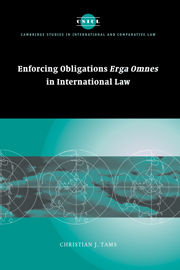Book contents
- Frontmatter
- Contents
- Foreword
- Preface
- Notes on citation
- Table of cases
- List of abbreviations
- Introduction
- Part I Background to the erga omnes concept
- Part II Legal issues raised by the erga omnes concept
- 3 Distinguishing types of erga omnes effects
- 4 Identifying obligations erga omnes
- 5 Standing to institute ICJ proceedings
- 6 Standing to take countermeasures
- 7 Erga omnes enforcement rights and competing enforcement mechanisms
- Conclusion
- Bibliography
- Index
- Cambridge Studies in International and Comparative Law
7 - Erga omnes enforcement rights and competing enforcement mechanisms
Published online by Cambridge University Press: 24 July 2009
- Frontmatter
- Contents
- Foreword
- Preface
- Notes on citation
- Table of cases
- List of abbreviations
- Introduction
- Part I Background to the erga omnes concept
- Part II Legal issues raised by the erga omnes concept
- 3 Distinguishing types of erga omnes effects
- 4 Identifying obligations erga omnes
- 5 Standing to institute ICJ proceedings
- 6 Standing to take countermeasures
- 7 Erga omnes enforcement rights and competing enforcement mechanisms
- Conclusion
- Bibliography
- Index
- Cambridge Studies in International and Comparative Law
Summary
The preceding chapters have shown that States can respond to breaches of obligations erga omnes by instituting ICJ proceedings and, if the breach is of a serious character, by resorting to countermeasures. As discussed in Chapter 4, these erga omnes enforcement rights are triggered by breaches of customary international law, on which the preceding analysis has consequently focused. The present chapter moves beyond customary international law and assesses whether the enforcement of obligations erga omnes could be affected by treaties. This could notably be the case if treaties protect the same interests as the erga omnes concept but confer upon States rights of protection that are substantially different from those deriving from the erga omnes concept. Where this is so, the State responsible for the wrongful conduct apparently incurs responsibility for the treaty breach and the breach of customary international law. State parties to the treaty in question may thus hold two sets of enforcement rights: as members of the international community, they have enforcement rights based on the erga omnes concept; as treaty parties, they have enforcement rights based on the treaty. The present section analyses the relation between these distinct sets of enforcement rights. More particularly, it inquires whether treaty-based enforcement systems complement or exclude the right of States to institute ICJ proceedings or take countermeasures in response to (serious) erga omnes breaches. Since the rules governing responses against erga omnes breaches are not peremptory in character, nothing would stop States from opting for a different regime.
- Type
- Chapter
- Information
- Enforcing Obligations Erga Omnes in International Law , pp. 252 - 305Publisher: Cambridge University PressPrint publication year: 2005

